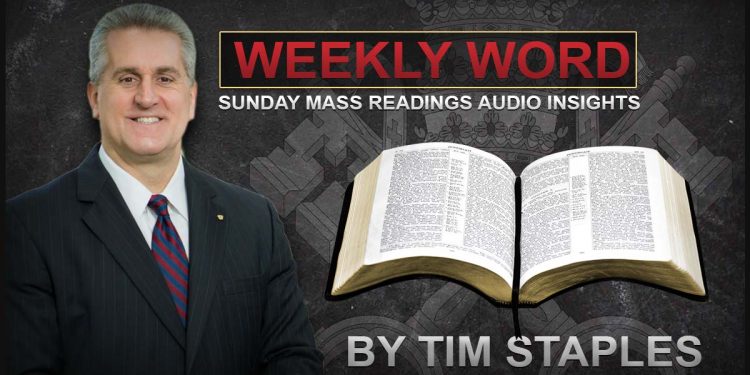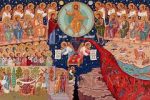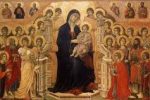Repent & Believe (1st Sunday In Lent)

(Text Transcribed via AI from Audio)
Hello apostolic Insiders and welcome. Not to the Staples household. This time I’m actually in a hotel here in Cincinnati, Ohio, where I’m giving three talks to 100 of my closest friends, actually to a big old men’s conference here in Cincinnati speaking tonight, which is Friday night, and then twice on Saturday. It’s going to be a huge event. Awesome.
But this is the first Sunday of Lent. This is an extremely important time, as you know, in the life of the church, in that this is the time where we really get tanked up for battle. And I know a lot of folks and I tend to be that way, you know, don’t like Lent because, you know, they’re not all excited about, you know, giving up stuff and sacrificing.
But you know what, my friends, this is what the spiritual life is all about. This is, as I said, a special time for us. This is a time to get empowered. And I want to take a look at the first reading. And it comes from Genesis chapter nine. And really, it’s the story of Noah, as you know, Genesis chapter nine versus eight through 15.
I want to focus on verse 11, their Genesis 911. It says, and I quote, I establish my covenant with you that never again shall all flesh be cut off by the waters of a flood and never again shall there be a flood to destroy the earth. The story of Noah and the Flood is a powerful presentation of two of the most important attributes of God, and that is His justice and His mercy.
The fact Jesus in the Gospel hammers the Pharisees because he, you know, he talked about how they strain at gnats and swallow camels, right? They they focused on the minutia and passed over the most important things, like the Justice and mercy of God. And in one of the other gospels, the love and mercy of God, but the justice and mercy of God.
If we miss it on either one of these, we missed the whole boat. And Noah, to me, is the story that really emphasized Jesus, both because obviously we’re talking about justice here. The world had rejected God and had gone so far away from God that God brings his judgment upon the world. And we’re going to talk more about that in a second, because sometimes that gets exaggerated as to what it means.
But I think more importantly, yes, more importantly, even though no doubt all the attributes of God are essential, they are all infinite. In God, mercy takes precedence over justice. As Saint James tells us, Mercy triumphs over justice. But without justice, there really can be no mercy. So you have that both. And why is that? Because mercy is the withholding of.
We’ve talked about this before, right? The withholding of just punishment as an act of love. So if you don’t have a sense of justice, you can’t know what mercy is because there has to be something to withhold. Right. To withhold that just punishment. And so if you don’t understand justice, mercy just becomes you’ve probably heard me say this before, sloppy, a gobby, as we used to say that when I was Protestant, you know, sloppy a copy, you know, I got paid write a love that just kind of falls all over itself and never requires any sort of commitment.
Never requires anything. Right. God, just loves and therefore accepts you as you are. And of course, we understand God accepts us as we are, but he loves us too much to let us stay that way. But at any rate, Noah is is just a powerful manifestation of both justice and mercy. Because, of course, God brings justice. And in a profound way.
But in that context, he then establishes his covenant, and that is his promise to us. That is God telling us that He is not about judgment, He is about mercy. Judgment is a necessity because God created us free and if we continue to reject God, we will experience justice. We bring it on ourselves. We built ourselves. We will experience judgment.
Absolutely. But God is all about mercy. And he establishes this covenant and puts the rainbow in the cloud in order to remind us, I will never do this again. I think of my own kids. You know, you guys have heard me say this, too. You know, I love my kids. I love them before I spank them while I spank them and after I spank.
But I can tell you, I don’t like spanking my kids, man. You have to do it. Because, you know, if you don’t, then your kids are going to run amok. And and, you know, they’re not going to be good kids. I don’t like it, but you have to do it. I much prefer, of course, you know, loving on them, giving them gifts and so forth and rewarding them for their good deeds.
Right. And that’s God. God is about love. He’s about mercy. And he loves to reward his people. And that’s what we see in Genesis. Now, I want to bring out a really important point. In order to do this, I’m going to fast forward now to the epistle from this Sunday, the first Sunday of Lent, from First Peter, Chapter three, verses 18 through 22.
And the reason is I want to dispel a myth about Noah and the flood. How many of you you’ve probably heard this myth before believe that when the eight were saved? No. In his family they were the only ones who made it to heaven. But all the rest. And we don’t know how many would have been on the earth at that time, but all the rest went to hell.
Well, that is simply not true. In fact, the reading for this Sunday is from First Peter 318 through 22 Listen to this. For Christ also died for sins once for all the righteous, for the unrighteous that he might bring us to God being put to death in the flesh, but made a life in the spirit in which look at verse 19, in which he went and preached to the spirits in prison.
BULLOCK Now, who is this talking about? Well, the catechism of the Catholic Church tells us in sections 632 and 633, but especially 632, the catechism points out and I quote, I’m just going to quote Section 632 of the frequent New Testament affirmations that Jesus was raised from the dead presupposed that the crucified one so joined in the realm of the dead prior to his resurrection.
Now that in the section or I should say footnote 478 and four, and especially for 17th nine references First Peter, Chapter three verses 18 and 19. Now listen, this was the first meaning again, that Christ, when he was crucified, so joined in the realm of the dead prior to his resurrection. In other words, he went down into hell, as we say in the Creed.
Now, this was not the place of the damned. Rather, he went down and proclaimed the truth of his being the Messiah to the righteous dead right now. Listen, this was the first meaning given in the apostolic preaching to Christ, ascending to hell that Jesus, like all men, experienced death and in his soul, joined the others in the realm of the dead.
But he descended there as Savior, proclaiming the good news to the spirits imprisoned there. Right now. He went down into hell again, as we say in the Creed. But who did he preach to there? Well, if we go to first, Peter, Chapter three. It’s more than just Noah and the eight righteous members of Noah’s family. Because again, let me back up the first Peter three Cain for Christ also died for sins once for all the righteous, for the unrighteous that he might bring us to God, being put to death in the flesh, but may live in the Spirit in which He went and preached to the spirits in prison.
Now, who are these? Are these just the eight members of Noah’s family? No, listen. In which he went and preached to the spirits in prison who formerly did not obey when God’s patience, waited in the days of Noah during the building of the ark, in which a few that is eight persons were saved through water. Now, wait a minute.
Who formerly did not obey. Wow. And then verse 21, baptism, which corresponds to this, now saves you not as a removal of dirt from the body, but as an appeal to God for a clear conscience through the resurrection of Jesus Christ who has gone into heaven and is at the right hand of God with angels, authorities and powers subject to Him.
So at least some among the disobedient would still make it to heaven. Folks, even though you say, Well, wait a minute, how can that be? Because doesn’t it say that that, you know, No, in the ark is a type of baptism, right? This corresponds to baptism, which now saves you not a removal of dirt from the body. In other words, it’s not just a mechanistic removal of dirt from the body, but as an appeal to God for a clear conscience through the resurrection of Jesus Christ.
So baptism now saves you. So how could people be saved who were disobedient during the building, the Ark and that sort of thing? Well, there we have kind of in seed form what we see elsewhere in the New Testament, and it has been developed in the history of the church, the understanding that some folks, even that were destroyed in the flood could have been invincible, ignorant of the truth and could have been where they were through no fault of their own, and therefore could have received the grace of baptism by their desire, with the grace of God, I should say.
And and in a sense, that is the grace of baptism in a prevailing sense, since before baptism. But the grace of God that God communicated to those in God alone is the one who knows who are truly invincible, ignorant, and who were not. That is God’s business. But I think the point being here is when we’re proclaiming the Gospel of Jesus Christ, we have to be very, very careful that we don’t fall prey to the errors of the Calvinists.
For example, You know, Jonathan Edwards, the famous Calvinist who wrote the famous sermon in 1642, Sinners in the Hands of an Angry God. It’s a beautiful literary piece, but my God, it’s awful bad. Everybody’s going to hell, I think, except Jonathan Edwards. You know, that’s a little hyperbole. But the point is, we don’t want to fall prey to this insistence, you know, that, you know, 90% of the world is going to hell or some, you know, crazy number like that.
Because, my friends, when you present it like that, it’s devastating, especially to young people when they’re really thinking about the faith and they’re being formed in their faith. Be very careful. Now, certainly, you know, I’ve talked about this before on Catholic answers Life. If you say that, you know, if there’s been 144, according to scientists, there have been 144 billion people that have lived on this planet.
I don’t know how they know that. That’s the estimate. Okay. I’ll give it to them. 144 billion people have lived here. If even 10% of those go to hell, what are we talking about? Over well over 14 billion souls, whether it’s 10%, 50%, 60. I mean, folks, we’re talking about high stakes here. There’s no need to exaggerate the number and, you know, put it up into absurd numbers.
But at any rate, that’s a little a point that’s really been getting my goat lately, because I do think it hurts us on the evangelism fields when we make outlandish statements. You know, like Jonathan Edwards, for example, and the Calvinists are famous for saying, you know, it’s just about everybody’s going to hell. But the bottom line is you don’t want to go to either extreme.
The fact is, souls are in hell. They’re going to be in hell. And a lot of them. And that should be impetus for us to evangelize because the message of of the readings for this Sunday, the first Sunday of Lent, is the mercy of God, you know. No. Of being the example of the fact that the stakes are high.
The people, you know, were killed in the flood. As the story goes here in Genesis chapter nine, this is God’s way of telling us the stakes are extremely high. But in the midst of it all, God’s message is one of mercy. And Psalm 25, the song for this Sunday, Beautiful Psalm here from Psalm 25, verses four through nine, and it actually cites verse ten as well as our response, three.
But let me just quote that respond to it. Psalm 2510 All the powers of the Lord are steadfast love and faithfulness for those who keep His covenant and his testimony. I think that sums up the Psalm and it really sums up the message of the readings for this first Sunday of Lent, not some of the paths. All the paths of the Lord are steadfast love and faithful, because God is faithful.
Even if Saint Paul tells us in Second Timothy Chapter two, verses 11 and 12, even if we remain faithless, God remains faithful because all the parts of the Lord our steadfast love and faithfulness, that’s what God, that’s who God is. He is faithful for those who keep His covenant and his testimonies. So again, does this mean he’s unfaithful to those who don’t know it doesn’t.
God is always faithful. However, the emphasis here is on if we do not keep his covenant judgment, it will ultimately fall. It doesn’t mean God’s not faithful. It means we’re not faithful. Right. His faithfulness, however, is as certain as the sun rising in the sky tomorrow. For those who keep his covenant and his testimonies, which leads us to the gospel and the heart of what the readings are all about.
This Sunday, the first Sunday of Lent marked Chapter one, verse 12. At the very beginning of Jesus ministry, the Spirit immediately drove Jesus into the wilderness, and He was in the wilderness for 40 days, tempted by Satan, and he was with the wild beast and the angels ministered to him. I love the way Mark’s Gospel. You can look at Matthew for Luke four and their versions of The Temptation in the Wilderness, but it’s Mark who brings out that that point there and the Angels minister to him.
He was so intensely in his fast. And by the way, how did Jesus fast? Well, the scripture doesn’t exactly tell us, but we do know that Moses fasted for 40 days without food or water, which is a miracle, a fast that’s miraculous By nature. He would have needed to have been ministered to by the angels in order to survive in the wilderness, The desert of 40 days and 40 nights without food or water.
And so that’s what we believe. Of course, Jesus fast would be at least equal to and in fact, given the temptation that he experienced, which is far worse than what Moses did, his was obviously even more difficult, not less so. But he was in the wilderness 40 days, tempted by Satan, and the fast was so intense that the angels had to minister unto him.
And I think that that kind of paints the picture here of what it is all about. It is a grave situation because of the fact that we, you know, Moses was in the wilderness of sin, right? That was the name of it. And we are as well. We’re in the wilderness of sin. Sin is is nipping at our heels every day, folks.
And you know, it’s true. Don’t look at me like you’re all holy, right? I mean, the battle is real and Lynn is a reminder of that. Guys, we’ve got to take serious offer something up, make it something substantial, something you can do, but something substantial and live it. Live the commitment of Lent allow the Holy Spirit to drive you and I into the wilderness, to be tempted by the devil.
And the devil is going to come. But look at verse 13. He was in the wilderness 40 days, tempted by Satan with the wild beasts. my goodness. Are we with the wild beasts? Right? And the angels ministered to him. Now, after John was arrested, Jesus came into Galilee preaching the Gospel of God and saying the time this fulfilled the kingdom of God is at hand, repent and believe the Gospel.
My goodness, folks, that sums it up right there. After this intense time of fasting, where without the minister’s help, his physical body could not have even survived. The testing was so intense and these 40 days in the desert. But what was it for? You see, we’re not Buddhists. We don’t, you know, deny ourselves for the sake of denying ourselves.
Right. But there is an end in mind. And that end is God. We deny ourselves so we can experience the goodness that is God himself. And without moving the bad out of our being, which is what Lent is all about, There’s no room for the goodness of God, folks. The goodness of God can’t exist where we have grave evils, obviously.
But even the venial sins and punishment do for sin drive God not completely out of our being, but God is not present in us to the degree God wants to be. And what is the ultimate end, of course, is union with God, but also so that we might bring as many souls as we can with us to heaven.
And that’s why immediately after this intense time of temptation at work, Jesus body was pummeled under the extraordinary rigors of 40 days without food and water. What does he do? He immediately declares, The time is fulfilled. The kingdom of God, His hand repent it and believe in the gospel. Folks, this world is in desperate need of the fullness of God’s of the Gospel of Jesus Christ.
That we alone possess as Catholics, you and I, let’s pray for each other. That this land will be the most special lent we have ever experienced. We’re going to go to confession. We’re going to offer up our sacrifices with joy, and we’re going to allow the Holy Spirit to permeate us so that we will begin. And you don’t have to wait until after the 40 days of Lent to proclaim the Gospel.
We can do it, of course, even now. But on Easter Sunday, May we all experience resurrected life like we’ve never experienced before, so that we will be like Jeremiah, where he says the word of God is like, Fire, Shut up in his bones. He tried to be silent, but he just couldn’t because he’s he was so filled with the word of God, he had to speak it.
God bless you.




